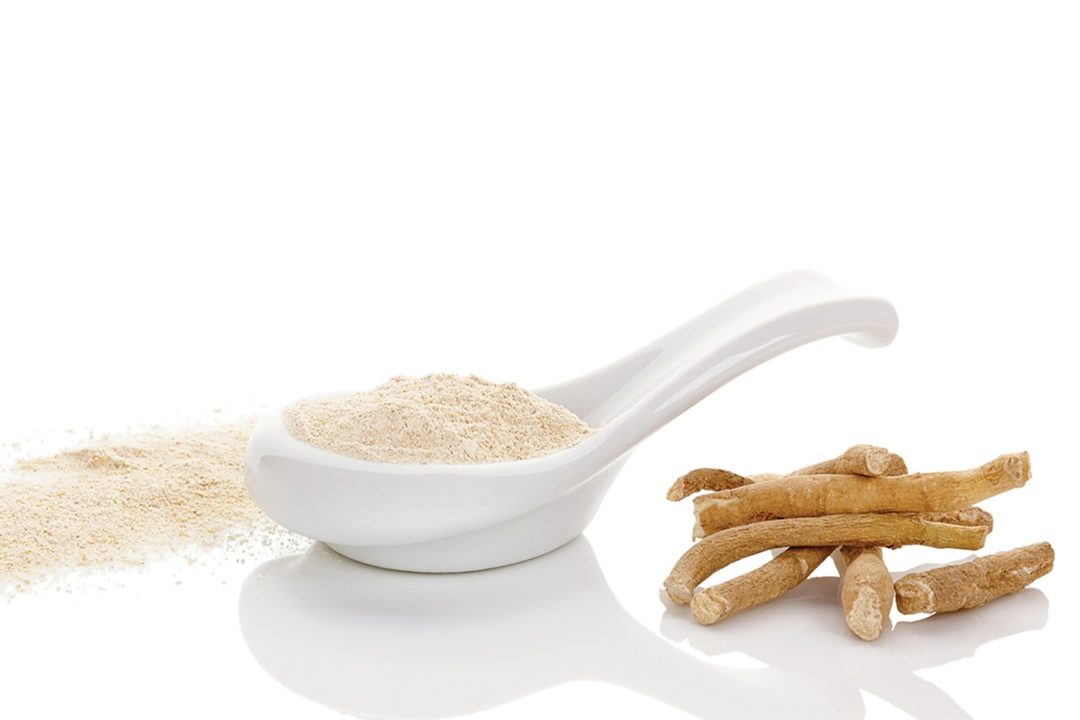In Ayurvedic, Indian, and Unani medicine, it is often referred to as “Indian ginseng” due to its restorative properties. It has been used traditionally for over 3,000 years to treat symptoms such as stress, anxiety, fatigue, lack of energy, and difficulty concentrating. The herb is believed to support an overall sense of wellbeing (1). It has also been applied to the skin to treat wounds, backache, and one-sided paralysis (2). Research has found that ashwagandha may be an easy and efficient way for people to improve their health and quality of life.
BenefitsOver 200 studies on the healing benefits of ashwagandha have been conducted by medical researchers (1). It is primarily supplemented to help support stress. Some evidence suggests that ashwagandha can help reduce symptoms of anxiety when combined with deep breathing (2). Physiologically, ashwagandha has been shown to significantly reduce cortisol concentrations and the immunosuppressive side effect of stress (3).
Studies have found that ashwagandha might offer heart health benefits as well, supporting risk factors such as high blood pressure, high cholesterol, chest pain, and heart disease. Athletic performance and recovery is another area in which ashwagandha has been studied. The Internal Journal of Ayurveda Research published a study concluding that ashwagandha can be useful for generalized weakness and improving speed and lower limb muscular strength and neuro-muscular coordination (4). Athletes should consider taking ashwagandha to enhance performance.
Ashwagandha is believed to have anti-inflammatory properties. In animal studies, it was found to be more potent than hydrocortisone, reducing swelling more than the steroid. A clinical trial involving 77 people suffering from Rheumatoid arthritis (RA) showed that symptoms improved for the patients when they were given 3 g of the herb orally three times a day with milk (5).
Elderly people who are at risk of neurodegenerative diseases should consider supplementing with ashwagandha. The African Journal of Traditional, Complementary and Alternative Medicines (AJTCAM) published a study stating that ashwagandha has multiple pharmacological actions including anti-stress, neuroprotective, antitumor, anti-arthritic, analgesic and anti-inflammatory. The AJTCAM explains that several studies have examined the herb’s ability to slow or in some cases even prevent loss of brain function in those with Alzheimer’s, Huntington’s, Parkinson’s, and other neurodegenerative diseases. Ashwagandha was found useful in children with memory deficit and in older people with loss of memory (6).
A few studies have discovered that ashwagandha might halt the growth of certain cancer cells. In one animal research study, ashwagandha was shown to shrink a lung tumor. Other studies point to the herb’s ability to slow breast, lung, kidney, and prostate cancer in humans (7). However, much more research is required to determine its efficacy.
Studies have shown that ashwagandha may also be used to treat male sexual dysfunction by increasing serum testosterone levels. The herb is often considered a “sexual restorative” that is beneficial for both men’s and women’s sexual health (8).
Research from a study published by the Journal of Evidence-Based Integrative Medicine suggests that ashwagandha root extract can be used for body weight management in adults under chronic stress. The double-blind, randomized, placebo-controlled trial studied 52 people experiencing chronic levels of stress. The subjects received either ashwagandha (300 mg) or a placebo twice a day. Subjects taking ashwagandha saw significant improvement in perceived stress, food cravings, happiness, serum cortisol, body weight, and body mass index. Furthermore, the extract was deemed safe and tolerable for human consumption (9).
Taking AshwagandhaTypically, Ashwagandha is ingested in the form of a capsule. The typical recommended dose is 500 to 1,000 mg twice a day. For those who suffer anxiety or chronic insomnia, ashwagandha can be effective when taken with warm milk before bed. Ashwagandha is also available as a fluid extract (prepared at a 1:1 ratio) with a recommended dosage between 2.5 mL to 5 mL. It is also available as a tea. Another way to include ashwagandha in the diet is by preparing it in soup stock. Drinking the broth, made from a handful of Ashwagandha roots and other spices, is a great way to optimize nutrition (8).
While there is limited available information on the long-term use of ashwagandha, it appears to be a safe supplement for most people. Those who should not take ashwagandha include pregnant and breastfeeding women, people with autoimmune diseases, children, and those on medication for thyroid disease. It is important for individuals to talk to a health care professional before adding any supplements into their diet.WF
References
- “What is Ashwagandha?” https://chopra.com/articles/what-is-ashwagandha Accessed January 16th, 2018.
- “Ashwagandha” https://www.webmd.com/vitamins-supplements/ingredientmono-953-ashwagandha.aspx?activeingredientid=953 Accessed January 16, 2018.
- “Summary of Ashwagandha” https://examine.com/supplements/ashwagandha/ Accessed January 16, 2018.
- “Effects of Withania somnifera(Ashwagandha) and Terminalia arjuna(Arjuna) on physical performance and cardiorespiratory endurance in healthy young adults” https://www.ncbi.nlm.nih.gov/pmc/articles/PMC2996571/ Accessed January 16, 2018.
- “Efficacy & safety evaluation of Ayurvedic treatment (Ashwagandha powder & Sidh Makardhwaj) in rheumatoid arthritis patients: a pilot prospective study” https://www.ncbi.nlm.nih.gov/pubmed/25857501 Accessed January 16, 2018
- “An Overview on Ashwagandha: A Rasayana (Rejuvenator) of Ayurveda” https://www.ncbi.nlm.nih.gov/pmc/articles/PMC3252722/ Accessed January 16, 2018.
- “Ashwagandha: Health Benefits and Side Effects” https://www.healthline.com/health/food-nutrition/ashwagandha-health-benefits#1 Accessed January 16, 2018.
- Ashwagandha Benefits, Dosage, Side Effects + More https://www.theayurvedaexperience.com/blog/what-is-ashwagandha-benefits-usage/ Accessed January 16, 2018.
- “Body Weight Management in Adults Under Chronic Stress Through Treatment With Ashwagandha Root Extract” http://journals.sagepub.com/doi/abs/10.1177/2156587216641830 Accessed January 16, 2018










